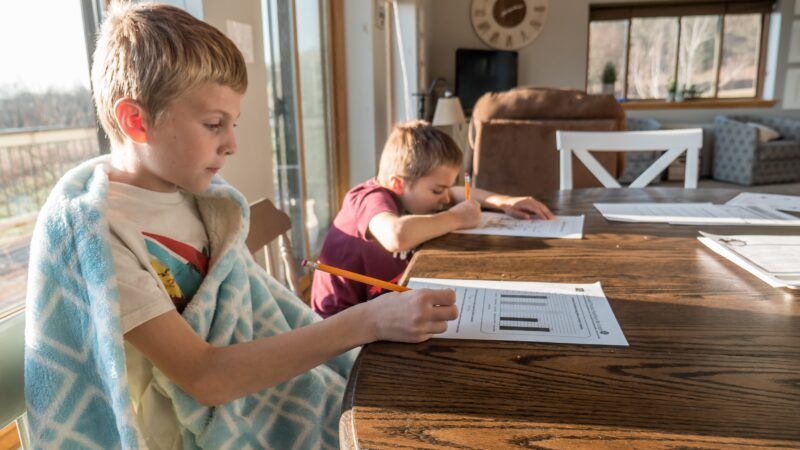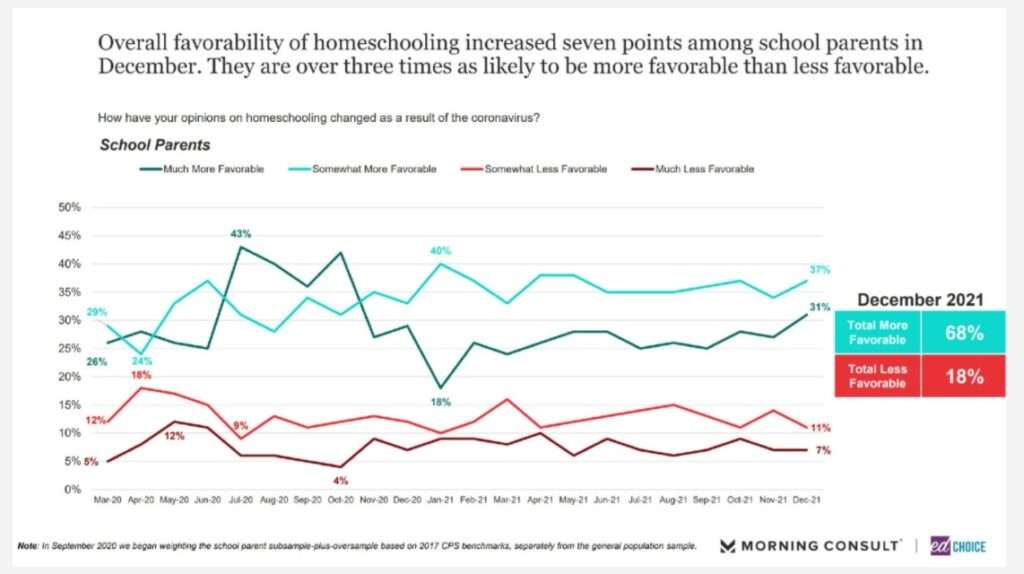The Pandemic Set Off a Homeschooling Boom. Don't Be So Sure That a Bust Is Coming.
In a new poll, more than two-thirds of parents say they have favorable views about homeschooling, and those numbers are on the rise.

The COVID-19 pandemic disrupted schools and turned kitchens into classrooms. It also appears to have put a decisive end to a decade of stagnation in the growth of American homeschooling.
Homeschooling, which is legal in all 50 states though the specific regulations vary widely from place to place, experienced a small boom during the late 1990s and early 2000s. By 2012, more than 3 percent of American school-aged children were being primarily educated at home. Those numbers plateaued, then boomed again during the first full year of pandemic-era schooling: at the start of the 2020-21 school year, a whopping 11 percent of U.S. households with school-aged children were homeschooling, according to Census Bureau data. The biggest increase in homeschooling was reported by black families, who had historically been less likely to homeschool before the pandemic.
Much of the sudden increase was no doubt due to necessity—schools being closed or operating virtually—or due to parents' worries about the pandemic. And, unsurprisingly, those figures fell off a bit by Christmas 2020, though they remained well above pre-pandemic levels.
We won't have new census data about the number of families who homeschooled during the 2021-22 academic year for a few more months, but there are already indications that disruptions triggered by the pandemic might turn into a permanent shift. A poll released last month, for example, found that parents of school-aged children have favorable views of homeschooling by a margin of about 3-to-1, and that favorable views of homeschooling continue to grow as the pandemic drags on.
The poll, conducted by Morning Consult at the request of Ed Choice, a pro-school-choice nonprofit, surveyed 2,200 parents about various aspects of the K-12 education experience. The section asking about homeschooling found that 68 percent of parents have "favorable" views on the subject, with a recent uptick in those with strongly favorable opinions.
"December 2021 was one of the highest homeschooling favorability rates since we began asking this question," writes John Kristof, a research analyst at Ed Choice. "Those identifying themselves as 'much more favorable' toward homeschooling was at its highest point since October of 2020."
Homeschooling rates are on the rise in part because of the pandemic-era popularity of so-called "learning pods," small groups of children gathering together under adult supervision for homeschooling or virtual schooling. Organized on an ad hoc basis during the early phases of the pandemic, pods have quickly become a more mainstream part of American K-12 education.
The Morning Consult/Ed Choice poll found that 89 percent of families currently participating in learning pods use them to supplement regular schooling, while 11 percent of current podders are using them as a substitute for traditional school. But the ranks of the learning-pod homeschoolers might continue to grow, as 31 percent of parents who said they were interested in joining a learning pod were considering it as a substitution for school.
December marked the third consecutive month in which Ed Choice found an increase in the number of parents who said they were interested in learning pods—perhaps due to the rise of the omicron variant and the renewed threat of school closures. On average, parents said they were willing to pay $469 per month to have their children participate in a pod. That suggests a robust market of entrepreneurial opportunities for pod-learning environments that is unlikely to vanish as the pandemic ends.
For some parents who started homeschooling during the pandemic, there's no going back to the old days, reports Laura Newberry, author of The Los Angeles Times' education-focused newsletter. After talking to 10 families that began homeschooling during the pandemic and plan to continue doing it, Newberry writes that "their rationales are diverse and the families span the socioeconomic and political spectrums: schools requiring too many COVID-19 safety protocols, or too few; the polarizing conversation around critical race theory; neurodivergent kids struggling with virtual instruction; and an overall waning faith in the public school system."
And, as the census data from last school year suggests, the rise in homeschooling is not merely a consequence of white, Christian families—the dominant demographic in homeschooling during recent times—exercising greater control over their children's educational path (or becoming disenchanted with the politicization of public schools). It's now black and Hispanic families who are exercising that choice.
"I can say that most of the parents I spoke with are thinking deeply about how to give their kids the most well-rounded education possible, as well as a variety of social opportunities. They see this choice as a reprioritization of values, an opportunity to really get to know their kids and nourish their natural curiosities," writes Newberry (though she repeats the inaccurate claim that "homeschooling is also largely unregulated in many states.")
Those ideas about how to best educate your own child might be flourishing now because of a pandemic and the ill-conceived public policy response to it. But the census data, polling, and reporting all indicate that parents choosing to homeschool during COVID are motivated by reasons that might transcend the current chaos.

